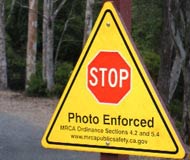Article from: www.thenewspaper.com/news/47/4753.asp
7/23/2015
California Appeal Court Backs Stop Sign Cameras
Appellate court notes that the California legislature slipped in a provision to rescue the legality of stop sign cameras.
 Although the California legislature has not explicitly sanctioned the use of stop sign cameras, the state Court of Appeal gave the automated ticketing systems a green light on Friday. A three-judge panel turned aside a legal challenge to the Mountains Recreation and Conservancy Authority (MRCA), which set up the cameras without following any of the state laws governing the use of red light cameras.
Although the California legislature has not explicitly sanctioned the use of stop sign cameras, the state Court of Appeal gave the automated ticketing systems a green light on Friday. A three-judge panel turned aside a legal challenge to the Mountains Recreation and Conservancy Authority (MRCA), which set up the cameras without following any of the state laws governing the use of red light cameras.
MRCA is a state government agency that manages 50,000 acres of park land between Santa Monica and Simi Valley. In 2007, it gave Redflex Traffic Systems of Australia free rein to issue automated citations using the first-of-their-kind stop sign cameras in Franklin Canyon in the heart of Los Angeles and another at the top of Topanga.
Under California law, red light camera tickets may only be issued if the driver is clearly visible in the photograph. Positive identification is required because the driver, who may not be the registered owner, will have a point assessed against his license. MRCA decided it did not want to pay Redflex for verifying photographs of drivers and instead called the $175 citations "administrative penalties." This arrangement allowed the agency to avoid splitting fine revenue with the state government. Motorist Danny Everett argued that was illegal.
For the appellate judges, the question turned on whether the roads within the MRCA jurisdiction are governed exclusively by the vehicle code. In 2011, the state legislature slipped in a vaguely worded provision saying the requirement for traffic laws to be uniform in the state "does not impair the current lawful authority" of MRCA to manage its lands. The court assumed this provision constituted authorization for the agency to create its own vehicle code.
"There is no language in the noted public resources code sections [establishing MRCA] which refers to compliance with the requirements of the vehicle code," Justice Tricia A. Bigelow wrote for the court. "In adopting and enforcing the MRCA ordinance, MRCA undoubtedly was acting in a 'management' capacity over the parkland properties under its control... Application of the vehicle code's provisions governing automated traffic enforcement systems, in particular Vehicle Code Section 210, plainly would diminish the value of, and or do harm to, MRCA's automated video camera traffic enforcement systems because the vehicle code requires automated traffic enforcement systems to have the capability of imaging the driver of a vehicle, and MRCA's system does not have that capability."
The particular legislation that created the MRCA loophole, Senate Bill 949, was explicitly introduced to stop cities from issuing administrative violations to avoid giving the state a cut of speeding ticket and red light camera ticket revenue. The court cited a statement from the bill analysis explaining the provision was designed to save the MRCA's camera program.
A copy of the ruling is available in a 200k PDF file at the source link below.
Source: Everett v. MRCA (Court of Appeal, State of California, 7/17/2015)
Permanent Link for this item
Return to Front Page
 Although the California legislature has not explicitly sanctioned the use of stop sign cameras, the state Court of Appeal gave the automated ticketing systems a green light on Friday. A three-judge panel turned aside a legal challenge to the Mountains Recreation and Conservancy Authority (MRCA), which set up the cameras without following any of the state laws governing the use of red light cameras.
Although the California legislature has not explicitly sanctioned the use of stop sign cameras, the state Court of Appeal gave the automated ticketing systems a green light on Friday. A three-judge panel turned aside a legal challenge to the Mountains Recreation and Conservancy Authority (MRCA), which set up the cameras without following any of the state laws governing the use of red light cameras.